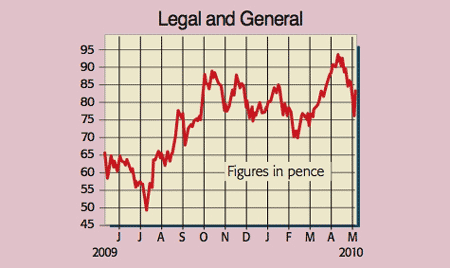
Who would want to be an insurer? With so many disasters this year – from earthquakes in China, Chile and Haiti, to volcanic explosions in Iceland and, more recently, the gigantic oil spill in the Gulf of Mexico – claims are going to be astronomic.
But things look better for the life-assurers. Thanks to record low interest rates, they have benefited as savers have shifted out of cash and into higher-yielding assets. Last week Legal & General posted better-than-expected first-quarter 2010 results, saying that it was being buoyed by heavy demand for Isas, unit trusts and other savings products (up 30%). Its asset-management arm reported gross inflows of £10.9bn, bringing its total firepower to £330bn. In terms of solvency, the group’s Insurance Group Directive surplus has jumped to a hefty £3.4bn, representing a coverage ratio of 231%.
By aggressively attacking its cost base (including a 17% cut in staff) in 2009, Legal & General managed to reduce its overheads by £69m. It generated £699m of cash flow (up 118%) and finished December with a net asset value of £6,695m.
That’s all positive, but what is the group worth? I would rate Legal & General on one times its net asset value, or about 113p per share. That suggests 40% upside from current levels. The shares trade on a 2010 price/earnings (p/e) ratio of 6.4 times, and offer a 4.8% yield.
Legal & General (LSE: LGEN), rated a BUY by Nomura
Going forward it may not be all plain-sailing. Indeed, Legal & General may (but probably won’t) incur future charges from left-field events, such as the counter-party risk associated with a sovereign debt crisis. Legal & General offers mortgage (for example, income and critical illness protection) products that are typically bought when properties are purchased, plus life-assurance policies that depend on future mortality rates. As such, earnings would be affected if there is another dive in the housing market, or life expectancies rose sharply above current forecasts.
Legal & General is subject to regulatory risk, given the proposed introduction of new legislation from Europe in 2012 (Solvency II). If enacted that would almost certainly require an increase in capital reserves, potentially hitting returns. However, early indications are that these guidelines will be watered down before the final laws are enacted. The firm is also well placed to profit from the gradual transfer of defined-benefit pension schemes into the sector as companies (and perhaps even the government) seek to de-risk their balance sheets.
So, with a first-rate franchise, together with the potential to be a tasty takeover target for an aggressive predator (it fended off Resolution, Clive Cowdery’s bid vehicle in 2009, for example), the shares rate as a buy. Nomura has a price target of 135p per share.
Recommendation: BUY at 80p
• Paul Hill also writes a weekly share-tipping newsletter, Precision Guided Investments